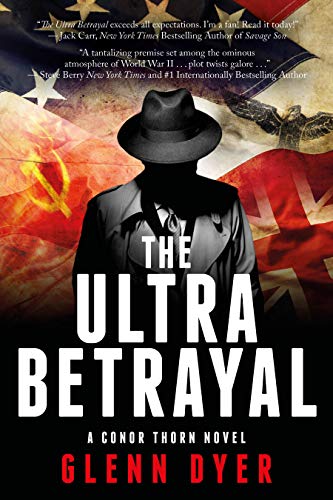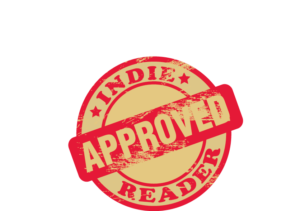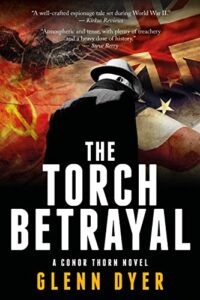The Ultra Betrayal received a 4+ star review, making it an IndieReader Approved title.
Following find an interview with author Glenn Dyer.
What is the name of the book and when was it published?
The Ultra Betrayal; Published June 9,2020.
What’s the book’s first line?
“Eve Lind scrubbed her hands with a stiff bristle brush and lye soap.”
What’s the book about? Give us the “pitch”.
One man’s dark deal with the Nazis could bring the Allies to their knees…
Autumn, 1942. Rule breaker OSS Agent Conor Thorn is assigned a mission to help the Allied war effort when a key Swedish cryptographer stationed in England goes missing. Thorn is determined to find him before critical information falls into enemy hands, but when his MI6 colleague vanishes trailing the code-breaker to Stockholm, Thorn is plunged yet again into a sinister Nazi conspiracy.
Can Thorn stop prized secrets from triggering more wartime carnage?
The Ultra Betrayal is the second novel in the thrilling Conor Thorn spy series. If you like harrowing historical drama, riveting espionage, and fast-paced action, then you’ll love Glenn Dyer’s well-researched World War II adventure.
What inspired you to write the book? A particular person? An event?
Like The Torch Betrayal, book one in the Conor Thorn Series, The Ultra Betrayal is inspired by an unsolved mystery I discovered during my research of World War II.
Here is a short passage from Anthony Cave Brown’s Bodyguard of Lies (1975, Harper & Row, Publishers, Inc.) that inspired The Ultra Betrayal.
“In June of 1938, Menzies (head of MI-6) had received a message that would prove to be the most important in the intelligence history of the Second World War. It came, again, from Gibson at Prague, who reported that he had just returned from Warsaw where . . . he had encountered a Polish Jew who had offered to sell MI-6 his knowledge of Enigma. The Pole, Richard Lewinski (not his real name), had worked as a mathematician and engineer at the factory in Berlin where Enigma was produced. But he had been expelled from Germany because of his religion and had come to the attention of the British Embassy at Warsaw . . . Lewinski announced his price: £10,000, a British passport, a resident’s permit for France for himself and his wife. He did not wish to live in England because he had no friends or ties there. Lewinski claimed that he knew enough about Enigma to build a replica, and to draw diagrams of the heart of the machine—the complicated wiring system in each of its rotors . . . The necessary arrangements were made, and Lewinski and his wife were taken . . . to Paris, traveling on a British diplomatic laissez-passez through Gdynia and Stockholm to avoid Germany . . . In the confusion and tumult of May and June 1940, MI-6 and Menzies were confronted with a number of urgent tasks—the most urgent of which was the security of Ultra. It was imperative to evacuate Lewinski and his wife from Paris lest they be captured by the Germans . . . When Lewinski arrived in London he was given lodgings by MI-6 and a police guard. Then he disappeared.”
Lewinski’s disappearance sparked my imagination and I used his story to inspire The Ultra Betrayal.
What’s the main reason someone should really read this book?
I spend much time researching to pull together a compelling plot. So, if you love history, specifically WWII, you may very well learn something and along the way come to like a very likable (I hope!) protagonist – Conor Thorn, born during the Easter Uprising in 1916 in Dublin, Ireland.
What’s the most distinctive thing about the main character? Who-real or fictional-would you say the character reminds you of?
Conor Thorn is unpredictable. He’s brash and impulsive . . . and brave. He likes/loves and respects women. And he is haunted by the loss of loved ones in his life. I patterned his character after Chris Pine’s portrayal of Captain Kirk in the Star Trek movies. He often did not follow orders. He was a born leader that inspired loyalty. And he returned that loyalty. And, he had a big heart, all characteristics that Conor Thorn embodied.
If they made your book into a movie, who would you like to see play the main character(s)?
Conor Thorn – Chris Pine; Emily Bright – Kate Winslet
When did you first decide to become an author?
My interest in writing fiction started to grow in my senior year in high school. I read a lot during college, both fiction and non-fiction (mostly creative writing books!). I first entertained writing a novel after reading The World According to Garp by John Irving just after graduating from Boston University. He’s a master of lyrical prose, and very inspirational.
Is this the first book you’ve written?
No. The Ultra Betrayal is my second novel. I have a screenplay in a drawer. Don’t make me show it to you, please.
What do you do for work when you’re not writing?
I retired from a career as a television executive after 35+ years. I now write full time. I miss the people I worked with in my first career tremendously. Writing is a solitary struggle. But, equally rewarding on a personal level. Not so much on a financial level! (Smiley face here.)
How much time do you generally spend on your writing?
I treat it as my new career. So, I work most days. Some days 8-10 hours, some days much less. But, it’s not just writing. It’s researching, marketing, engaging others on social media. There’s a lot of moving parts to independent publishing.
What’s the best and the hardest part of being an indie?
Hardest: There’s so much information out there about how to accomplish all sorts of tasks related to being a successful indie. It takes time to figure out what works for you. Best: Getting great reviews from your peers. Can’t beat it!
What’s a great piece of advice that you can share with fellow indie authors?
You can’t do it alone. Seek out advice/help in the form of writing coaches, marketers, editors, cover/interior designers. After a while, you can learn to do interior formatting and cover design yourself. But, maybe you would prefer to focus on the writing. Nothing wrong with that. But, you MUST establish a relationship with an editor you trust. Competition out there is top notch. A great editor is a MUST.
Would you go traditional if a publisher came calling? If so, why?
Probably, just to be able to see the difference in the publishing experience.
Is there something in particular that motivates you (fame? fortune?)
I write to be read. I will not get rich from this endeavor. And I get a rush seeing my books on my bookshelf! Who wouldn’t!
Which writer, living or dead, do you most admire?
So many. John Irving, certainly. Herman Wouk. Leon Uris. Steve Berry. Daniel Silva. Harlan Coben, and not just because we’re from the same home town!
Which book do you wish you could have written?
A World According to Garp, by John Irving. I can’t resist adding a couple more: Code Name Verity by Elisabeth Wein and The Soul of a Thief by Steven Hartov.


